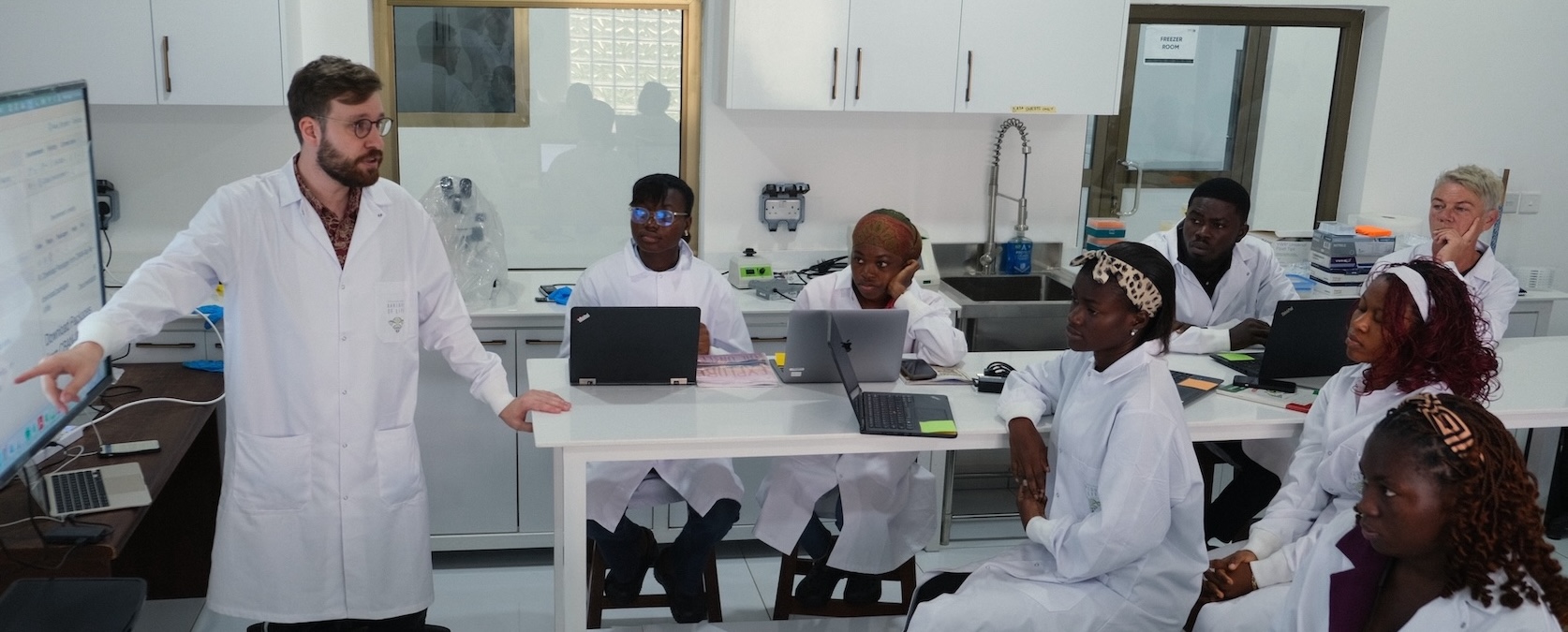Science
University of Guelph Experts Empower Scientists in Peru and Ghana

The Centre for Biodiversity Genomics (CBG) at the University of Guelph recently extended its reach beyond Canada, sharing vital DNA barcoding technology with emerging scientists in Peru and Ghana. This initiative aims to enhance scientific capacity in regions rich in biodiversity but often lacking access to advanced molecular biology resources.
Training Future Scientists in DNA Barcoding
During the summer of 2023, members of the CBG team visited institutions in Peru and Ghana to provide comprehensive training on DNA barcoding. This process involves collecting samples from the field, extracting DNA, conducting polymerase chain reactions (PCR), and performing data analysis. The program was designed for graduate students and select delegates, focusing on empowering them with the skills needed to document and analyze biodiversity effectively.
Dr. Paul Hebert, the founder of the CBG, emphasized the importance of building scientific capacity in the Global South, stating, “As much of the world’s biodiversity lies in the Global South, it is critical that we build scientific capacity in these nations.” The training was facilitated by advancements in sequencing technologies and the development of an integrated package of software and hardware.
The initiative is part of the International Barcode of Life consortium (iBOL), which collaborates with researchers and organizations in over 40 countries to complete the inventory of all life on Earth through DNA analysis. This collective effort aims to enhance global biodiversity research and empower the next generation of scientists.
Hands-On Learning Experience
At the University of Ghana, Dr. Ken Thompson, an evolutionary ecologist at CBG, and Dr. Spencer Monckton, the taxonomy lead, worked alongside colleagues from the University of Johannesburg to train 35 participants from Ghana, Côte d’Ivoire, and Guinea. Monckton observed that access to molecular biology in Africa is significantly limited compared to Western standards, which highlights the importance of initiatives like these.
“One of our primary objectives with the workshop was to bridge that gap by equipping delegates with the knowledge and skills to access DNA barcoding more easily,” Monckton said. The training included lectures and hands-on laboratory work, where participants engaged directly with DNA barcoding technology, a method that streamlines species identification.
Thompson, part of CBG’s innovation team, noted the enthusiasm of the participants, saying, “These participants had serious drive; they would ask for homework and were often working late into the night. They were eager to learn.” The program utilized specimens from local biodiversity research, allowing participants to complete projects and present their findings.
The training sessions also provided valuable learning experiences for the CBG experts. In Lima, the team worked with various specimens, including insects and plankton, while in Ghana, they focused predominantly on insect species. This exchange of knowledge not only benefitted the trainees but also enriched the instructors’ understanding of biodiversity in these regions.
Both Monckton and Thompson expressed their commitment to supporting the participants beyond the training. They offered ongoing assistance with analyses and future learning, and several participants have already reached out for further guidance. The team is also maintaining connections with participants from Peru who will visit CBG for additional training and exchange opportunities.
“There is so much interest in what we do at CBG,” Thompson remarked. “It is extremely rewarding. Education really is a life-changing opportunity for people.” This initiative exemplifies the potential impact of collaborative efforts in advancing scientific knowledge and fostering a new generation of biodiversity researchers in underrepresented regions.
-

 Education3 months ago
Education3 months agoBrandon University’s Failed $5 Million Project Sparks Oversight Review
-

 Science4 months ago
Science4 months agoMicrosoft Confirms U.S. Law Overrules Canadian Data Sovereignty
-

 Lifestyle3 months ago
Lifestyle3 months agoWinnipeg Celebrates Culinary Creativity During Le Burger Week 2025
-

 Health4 months ago
Health4 months agoMontreal’s Groupe Marcelle Leads Canadian Cosmetic Industry Growth
-

 Science4 months ago
Science4 months agoTech Innovator Amandipp Singh Transforms Hiring for Disabled
-

 Technology3 months ago
Technology3 months agoDragon Ball: Sparking! Zero Launching on Switch and Switch 2 This November
-

 Education3 months ago
Education3 months agoRed River College Launches New Programs to Address Industry Needs
-

 Technology4 months ago
Technology4 months agoGoogle Pixel 10 Pro Fold Specs Unveiled Ahead of Launch
-

 Business3 months ago
Business3 months agoRocket Lab Reports Strong Q2 2025 Revenue Growth and Future Plans
-

 Technology2 months ago
Technology2 months agoDiscord Faces Serious Security Breach Affecting Millions
-

 Education3 months ago
Education3 months agoAlberta Teachers’ Strike: Potential Impacts on Students and Families
-

 Science3 months ago
Science3 months agoChina’s Wukong Spacesuit Sets New Standard for AI in Space
-

 Education3 months ago
Education3 months agoNew SĆIȺNEW̱ SṮEȽIṮḴEȽ Elementary Opens in Langford for 2025/2026 Year
-

 Technology4 months ago
Technology4 months agoWorld of Warcraft Players Buzz Over 19-Quest Bee Challenge
-

 Business4 months ago
Business4 months agoNew Estimates Reveal ChatGPT-5 Energy Use Could Soar
-

 Business3 months ago
Business3 months agoDawson City Residents Rally Around Buy Canadian Movement
-

 Technology2 months ago
Technology2 months agoHuawei MatePad 12X Redefines Tablet Experience for Professionals
-

 Business3 months ago
Business3 months agoBNA Brewing to Open New Bowling Alley in Downtown Penticton
-

 Technology4 months ago
Technology4 months agoFuture Entertainment Launches DDoD with Gameplay Trailer Showcase
-

 Technology4 months ago
Technology4 months agoGlobal Launch of Ragnarok M: Classic Set for September 3, 2025
-

 Technology4 months ago
Technology4 months agoInnovative 140W GaN Travel Adapter Combines Power and Convenience
-

 Science4 months ago
Science4 months agoXi Labs Innovates with New AI Operating System Set for 2025 Launch
-

 Technology4 months ago
Technology4 months agoNew IDR01 Smart Ring Offers Advanced Sports Tracking for $169
-

 Top Stories2 months ago
Top Stories2 months agoBlue Jays Shift José Berríos to Bullpen Ahead of Playoffs










